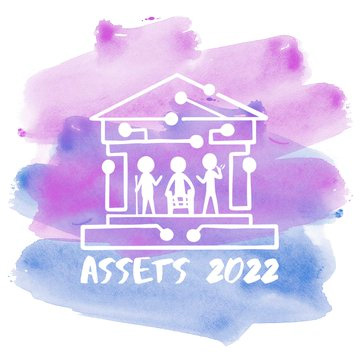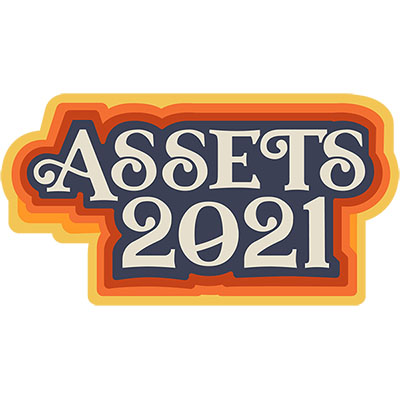May 13, 2025 A central figure in Seattle’s human-computer interaction (HCI) community and beyond, Fogarty has made key contributions in accessibility, sensor-based interactions, interactive machine learning, and personal health informatics. He has played a pivotal role in founding and growing Design, Use, Build (DUB) — the UW’s cross-campus HCI alliance bringing together faculty, students, researchers and industry partners. “I am honored to be among the SIGCHI Academy Class of 2025,” Fogarty said. “I’m grateful for the amazing students and collaborators…
Category: Awards
CREATE awarded $4.6M for research on AI risks, opportunities for people with disabilities
September 10, 2024 For some time now, CREATE researchers have been exploring these pressing questions. And now, CREATE will be leading a Rehabilitation Engineering Research Center (RERC) on participatory, assistive, inclusive, and responsible use of AI technology, funded by the National Institute on Disability, Independent Living, and Rehabilitation Research (NIDILRR), a program of the Administration for Community Living, U.S. Department of Health and Human Services. The interdisciplinary team of researchers involved with this RERC come from the College of Engineering, the Allen…
Gatzert Child Welfare Fellowship for Reham Abuatiq
June 13, 2024 Advised by CREATE associate director Heather Feldner, Abuatiq’s dissertation work explores the Healthcare Transition of Middle Eastern Youth with Intellectual and Developmental Disabilities and their Families. Using both qualitative and participatory methods, her research goals are to: Abuatiq is currently working with one of CREATE’s community partners, Open Doors for Multicultural Families (ODMF), which provides grassroots community-based services and supports for immigrants and refugees in the WA area living with disabilities. ODMF plans to host a photo exhibition in…
CREATE Students Honored in Husky100
Two students selected for the 2024 Husky 100 exemplify CREATE’s mission to make technology accessible and make the world accessible through technology while involving people with lived disability experiences in their research. Kianna Bolante Ethan Gordon
Amy Ko named ACM Distinguished Member
March 18, 2024 Congratulations to CREATE faculty Amy J. Ko, who has been recognized as a Distinguished Member of the Association for Computing Machinery (ACM) for her work on human-centered theories of program understanding and the development of tools and learning technologies. “I’m honored to be recognized by my nominators, all of whom have been role models and mentors in my career,” said Ko, a professor in the iSchool. “It makes me want to pay their giving and caring work forward to more junior…
Zhang is CREATE’s Newest Apple AIML fellow
March 18, 2024 Congratulations to Zhuohao (Jerry) Zhang – the most recent CREATE Ph.D. student to receive an Apple Scholars in AIML PhD fellowship. The prestigious award supports students through funding, internship opportunities, and mentorship with an Apple researcher. Zhang is a 3rd-year iSchool Ph.D. student advised by Prof. Jacob. O Wobbrock. His research focuses on using human-AI interactions to address real-world accessibility problems. He is particularly interested in designing and evaluating intelligent assistive technologies to make creativity tasks accessible….
Anat Caspi receives Human Rights Educator Award
Congratulations to Anat Caspi on receiving the 2023 Human Rights Education Award from the Seattle Human Rights Commission! Caspi, a CREATE associate director and the founder and director of the Taskar Center for Accessible Technology, thanked the commission for recognition of her individual dedication and emphasized that it also celebrates the collective efforts of the Taskar Center community. You can watch as Olivia Quesada accepts the award on Caspi’s behalf at the ceremony.
CREATE Open Source Projects Awarded at Web4All
July 6, 2023 CREATE researchers shone this spring at the 2023 Web4All 2023 conference that, in part, seeks to “make the internet more accessible to the more than one billion people who struggle to interact with digital content each day due to neurodivergence, disability or other impairments.” Two CREATE-funded open source projects won accolades. Best Technical Paper award:Understanding and Improving Drilled-Down Information Extraction from Online Data Visualizations for Screen-Reader Users Authors: Ather Sharif, Andrew Mingwei Zhang, CREATE faculty member Katharina…
CREATE Ph.D. Student Emma McDonnell Wins Dennis Lang Award
June 6, 2023 Congratulations to Emma McDonnell on receiving a Dennis Lang Award from the UW Disability Studies program! McDonnell, a fourth year Ph.D. candidate in Human Centered Design & Engineering, is advised by CREATE associate director Leah Findlater. McDonnell’s research focuses on accessible communication technologies and explores how these tools could be designed to engage non-disabled people in making their communication approaches more accessible. She has studied how real-time captioning is used during videoconferencing and her current work is…
UW and CREATE extended family shine in SIGCHI Awards
We’re so proud to have learned from and collaborated with these shining stars! UW and CREATE faculty and our extended family are prominent in the recently announced 2023 SIGCHI Awards. All three winners of the SIGCHI dissertation award, which recognizes “the most outstanding research contributions from recently graduated Ph.D. students within the HCI community” are associated with the UW, CREATE, and/or our campus partner, UW DUB (Design. Use. Build). Congratulations to all! Nicola Dell, ’15 Ph.D. UW Computer Science and…
Jacob O. Wobbrock awarded Ten-Year Technical Impact Award
January 5, 2023 The Association for Computing Machinery (ACM) has honored CREATE Co-Director Jacob O. Wobbrock and colleagues with a 10-year lasting impact award for their groundbreaking work improving how computers recognize stroke gestures. Wobbrock, a professor in the Information School, and co-authors Radu-Daniel Vatavu and Lisa Anthony were presented with the 2022 Ten Year Technical Impact Award in November at the ACM International Conference on Multimodal Interaction (ICMI). The award honors their 2012 paper titled Gestures as point clouds: A $P recognizer…
Rory Cooper, CREATE Advisory Board member, receives IEEE Biomedical Engineering Award
Congratulations to CREATE Advisory Board member Rory Cooper on receiving the 2022 IEEE Biomedical Engineering Award! For more than 25 years, Cooper has been developing technology to improve the lives of people with disabilities and his inventions have helped countless wheelchair users get around with more ease and comfort. Cooper’s first innovations in mobility were a modification to the back brace he wore after a spinal cord injury left him paralyzed from the waist down, then a better wheelchair, then an electric-powered version that…
CREATE Leadership at ASSETS’22 Conference

CREATE Associate Director Jon Froehlich was the General Chair for ASSETS’22, the premier ACM conference for research on the design, evaluation, use, and education related to computing for people with disabilities and older adults. This year, over 300 participants from 37 countries engaged with state-of-the-art research in the design and evaluation of technology for people with disabilities. UW CREATE was a proud sponsor of ASSETS’22. Keynote speaker Haben Girma is the first Deafblind graduate of Harvard Law School and a…
Jen Mankoff receives SIGCHI Social Impact Award
Congratulations to CREATE Co-Director Jennifer Mankoff! She has been awarded a 2022 Social Impact Award by SIGCHI, the special interest group of the Association for Computing Machinery (ACM) for professionals, academics and students interested in human-technology and human-computer interaction (HCI). Mankoff was cited for research focused on accessibility to give people the voice, tools and agency to advocate for themselves. “She strives to make change at both structural and individual levels. For example, her recent work on fabrication of accessible…
Feldner and Harniss receive research poster award for work on allyship training in rehabilitation education
Heather Feldner and Mark Harniss team received a blue ribbon award as one of the top 3 posters for Social Responsibility at an American Physical Therapy Association meeting.
Richard Ladner named AAAS Fellow
Congratulations to CREATE Director for Education Richard Ladner on being named a Fellow of the American Association for the Advancement of Science (AAAS)! He is among 564 new fellows from around the world elected in 2021 for distinguished achievements in science and engineering. Ladner was recognized for his advocacy and inclusion efforts for people with disabilities in computer science and related fields. His work has included development of numerous tools to perform specific tasks, including translating textbook figures into formats…
Faculty and Alumni win awards at ASSETS 2021

CREATE faculty and alumni scooped up several awards at the ASSETS 2021 conference. Paper Impact Award: Mankoff, Best Paper award: Katharina Reinecke, Best Artifact: scia11y team.
Jon Froehlich named Outstanding Faculty Member by the UW College of Engineering
Congrats to CREATE Associate Director Jon Froehlich on being selected for the Outstanding Faculty Award by the UW College of Engineering! As noted by the College, Froehlich went to extraordinary measures to support his students’ learning during the pandemic. He fundamentally transformed physical computing courses for virtual platforms, assembled and mailed hardware kits to students’ homes, and developed interactive hardware diagrams, tutorials and videos. In addition, Froehlich co-created and led a group of university educators to share best practices for…
Richard Ladner Receives 2020 Public Service Award from National Science Board
National Science Board | August 11, 2020 Dr. Richard Ladner, CREATE’s Director for Education, has been named the 2020 recipient of the Public Service Award for an individual from the National Science Board (NSB). In recognizing Ladner, the board cited his exemplary science communication, diversity advocacy, and well-earned reputation as the “conscience of computing.” “When we think about diversity, we must include disability as part of that. The conversation about diversity should always include disability.” Richard Ladner, Professor Emeritus, University of Washington’s Paul G. Allen School of Computer Science & Engineering From…
UW Disability Studies, D Center win UW Medicine CLIME Grant
UW faculty and staff affiliated with CREATE, UW Disability Studies and the UW D Center have received a grant from the Center for Leadership and Innovation in Medical Education (CLIME) to explore what it means to be an ally to people with disabilities. “This is an integral issue informing professional education in the medical fields as well as in design and engineering, says PI Heather Feldner. “I am most excited that this project has the potential to further the conversation about how an…